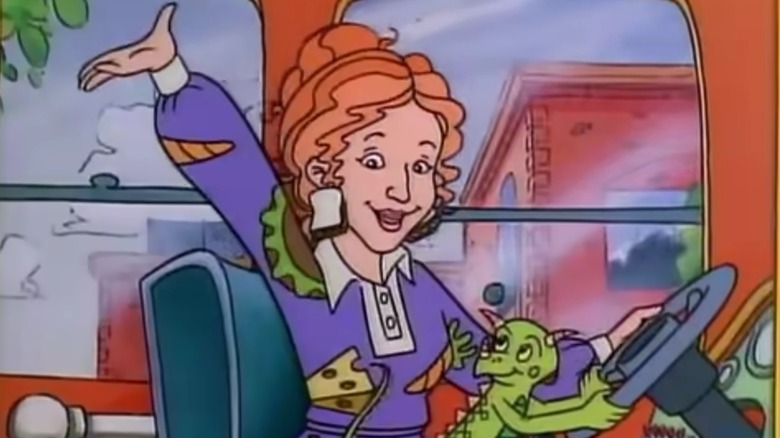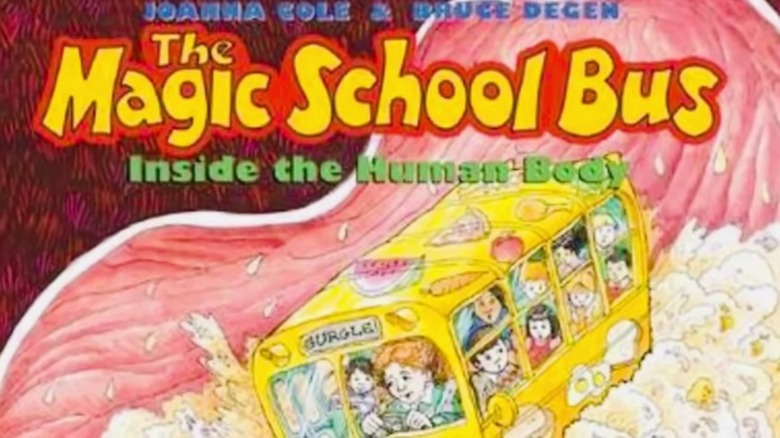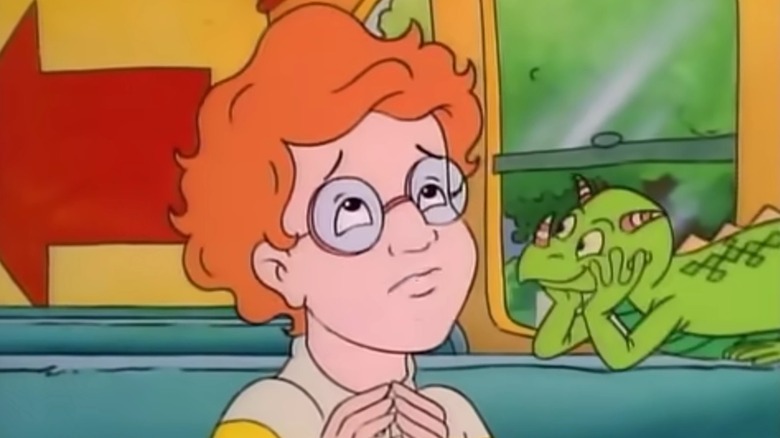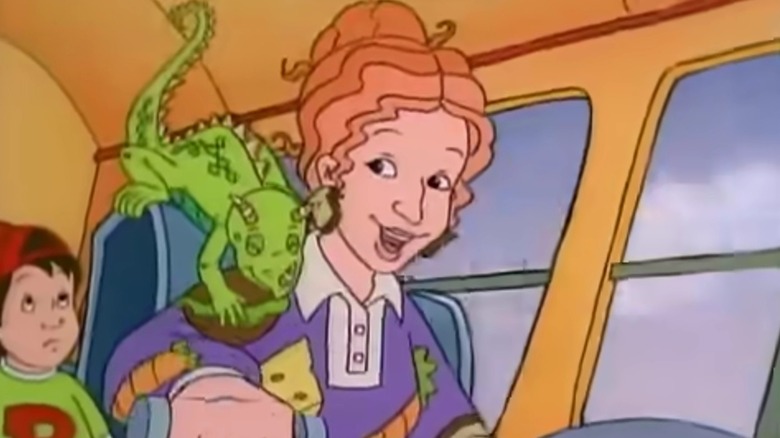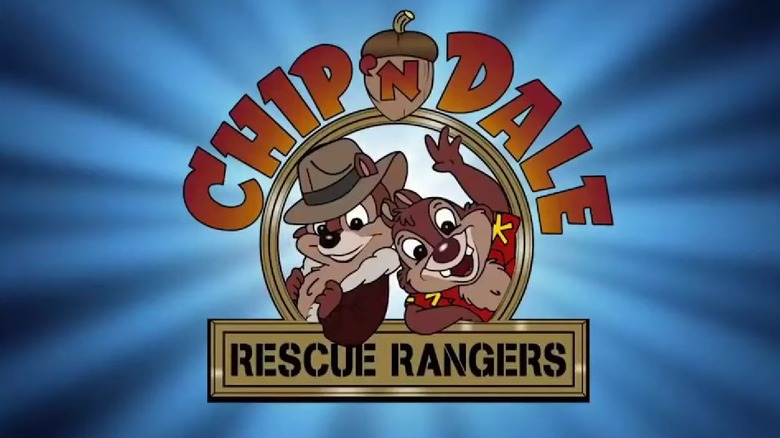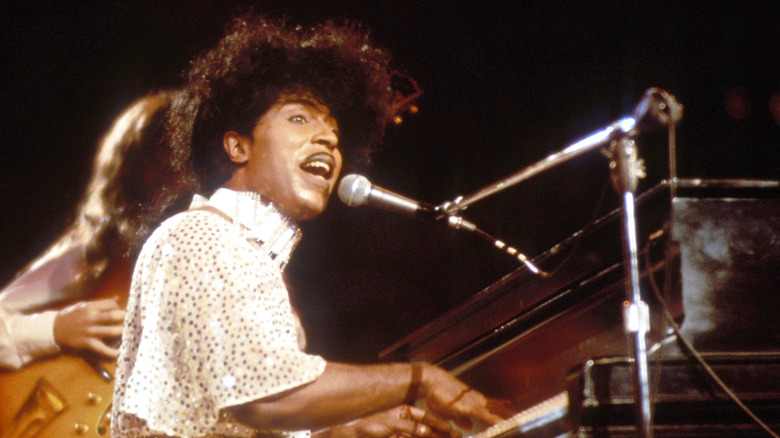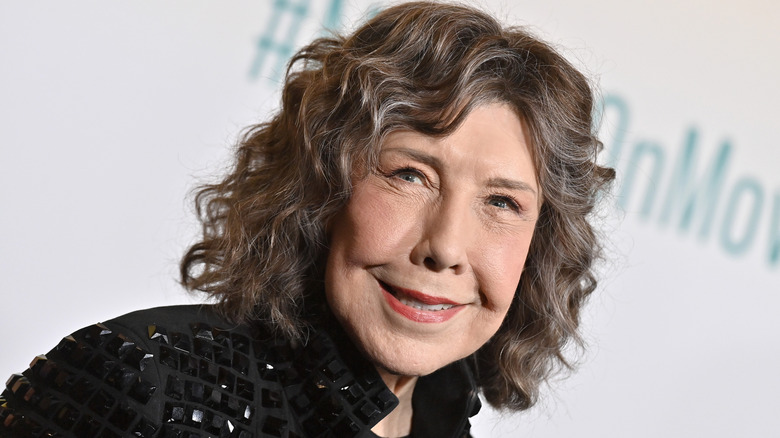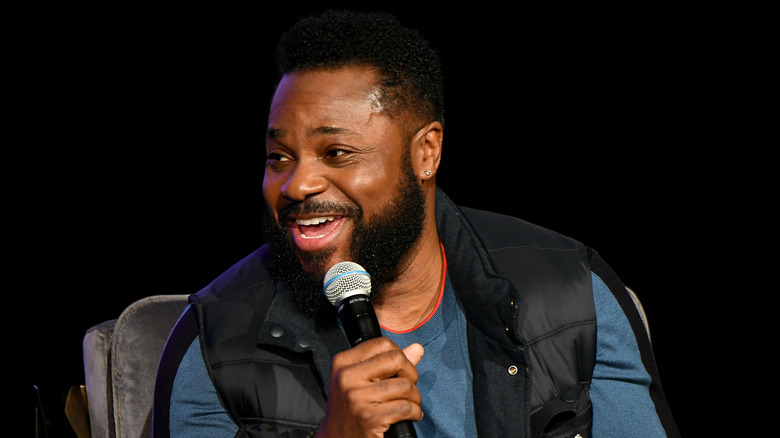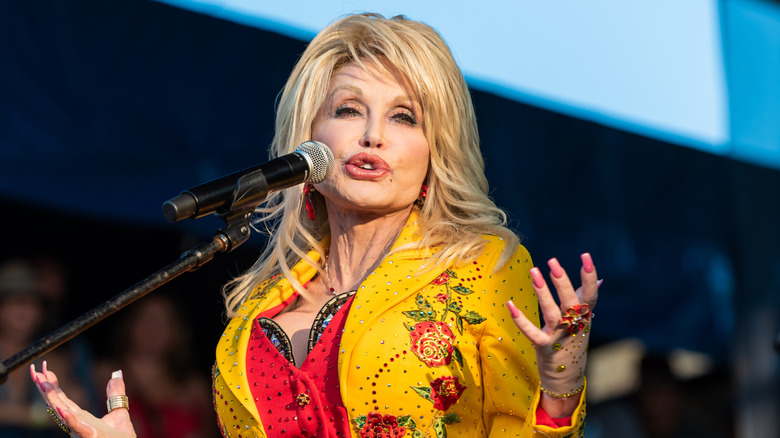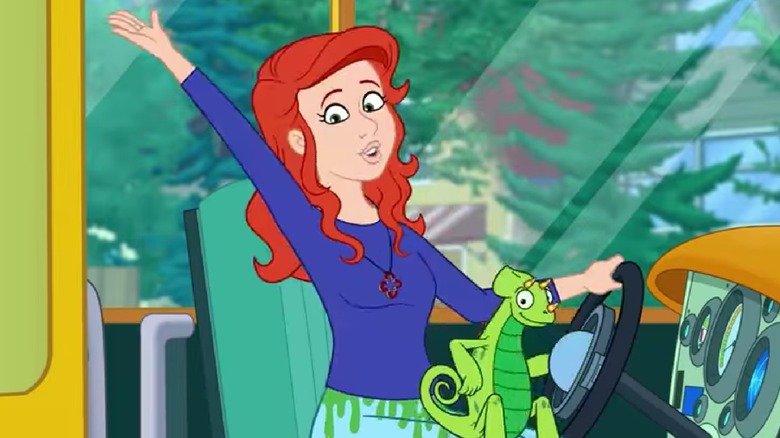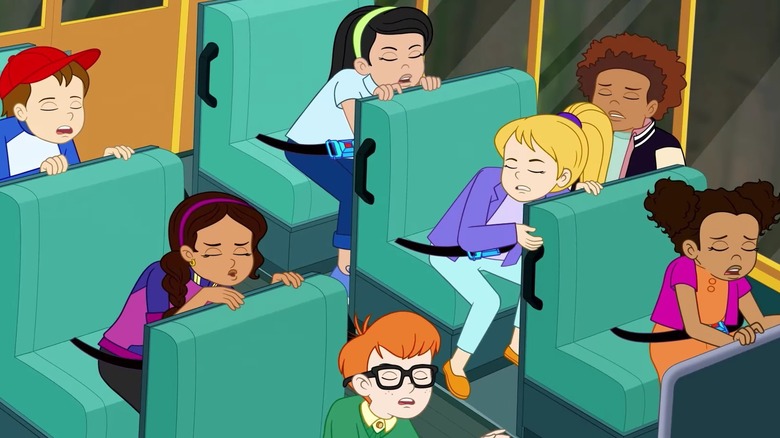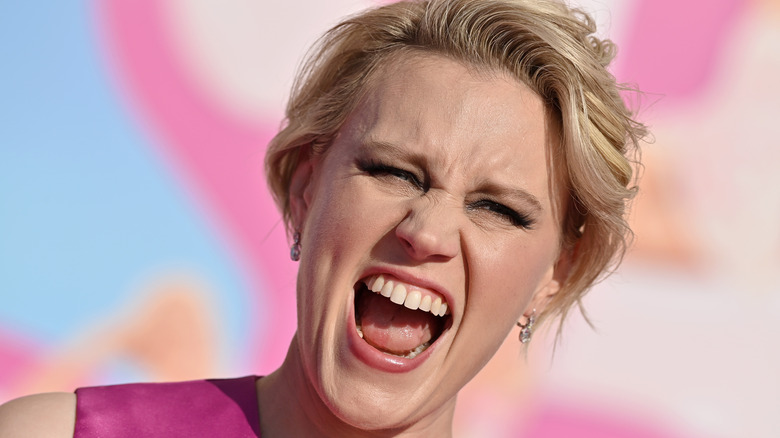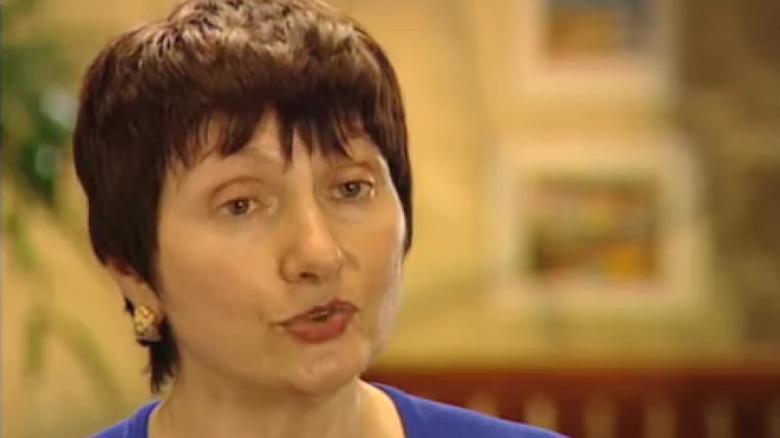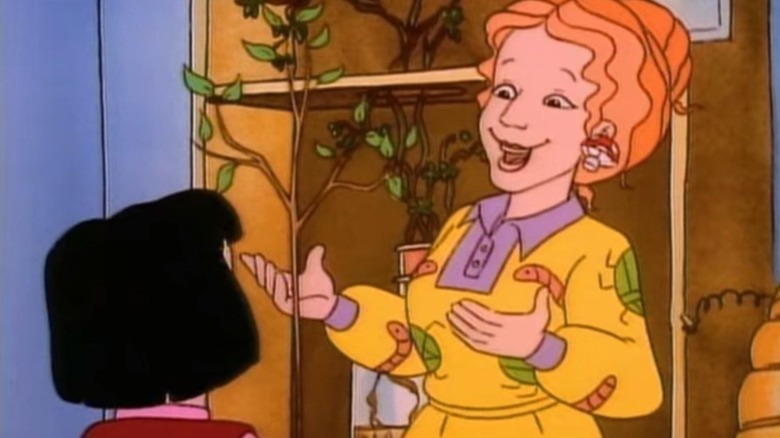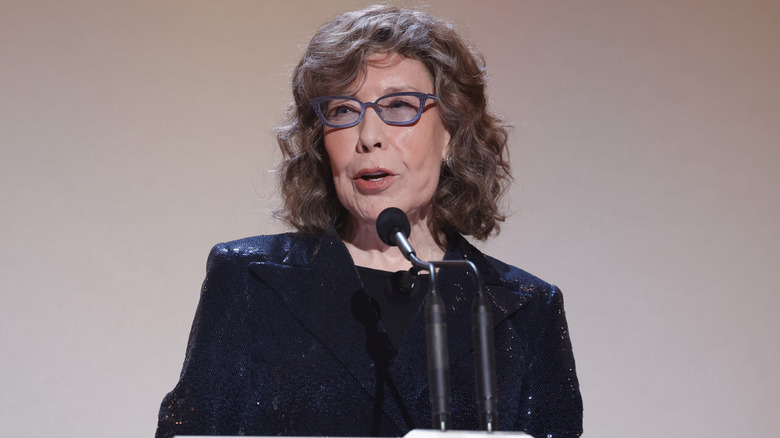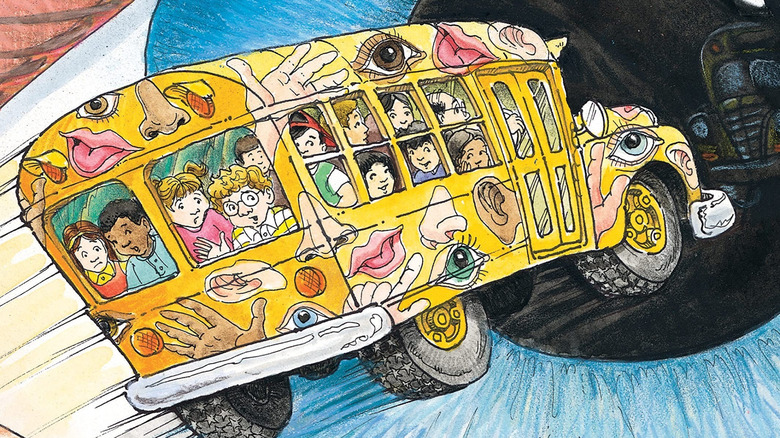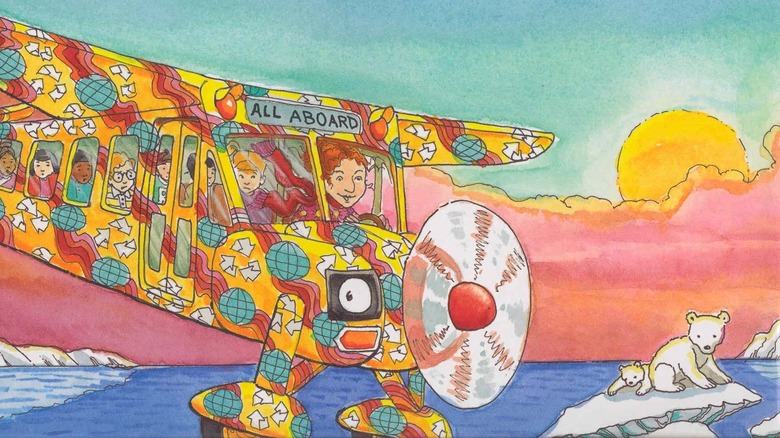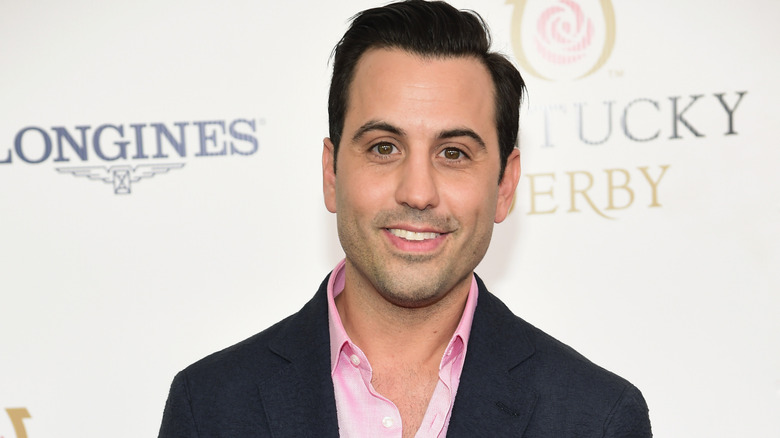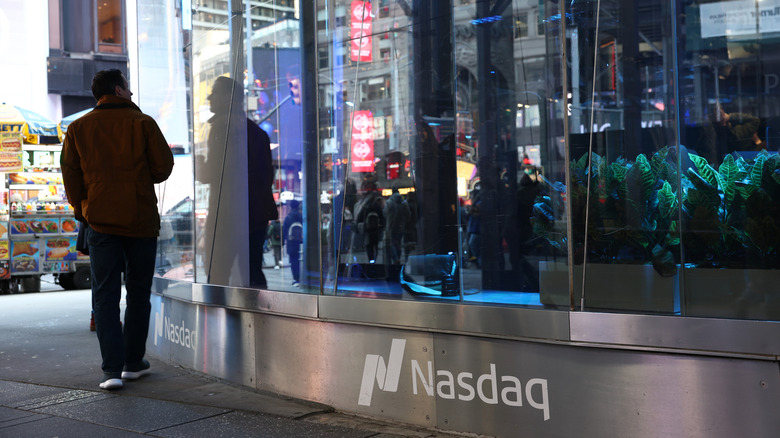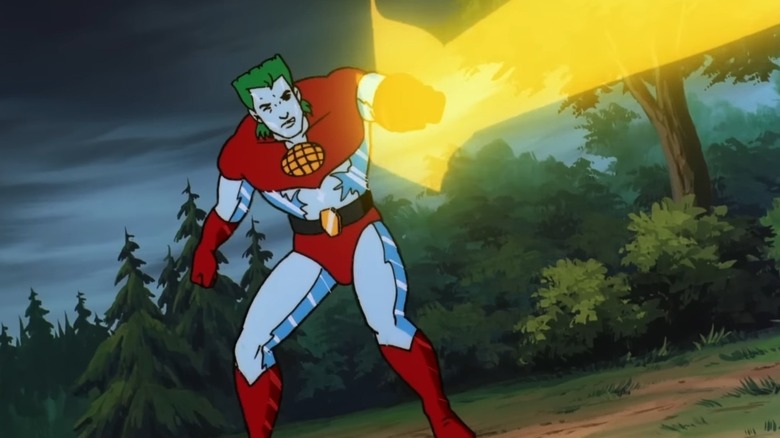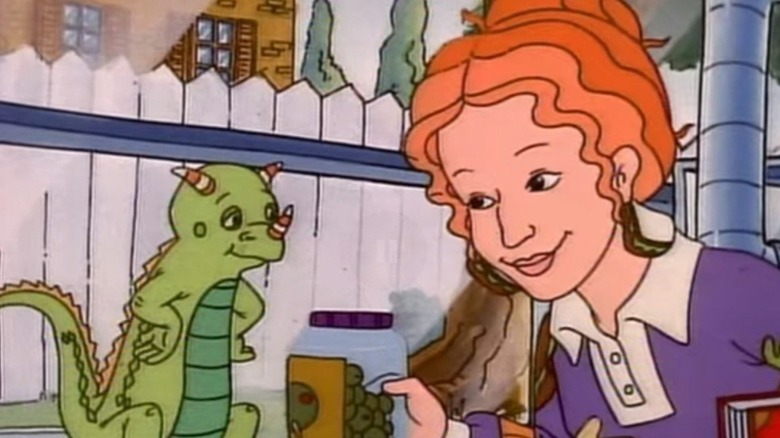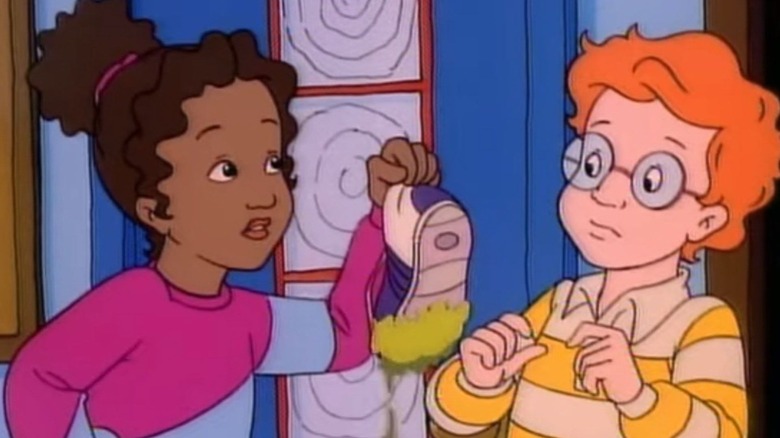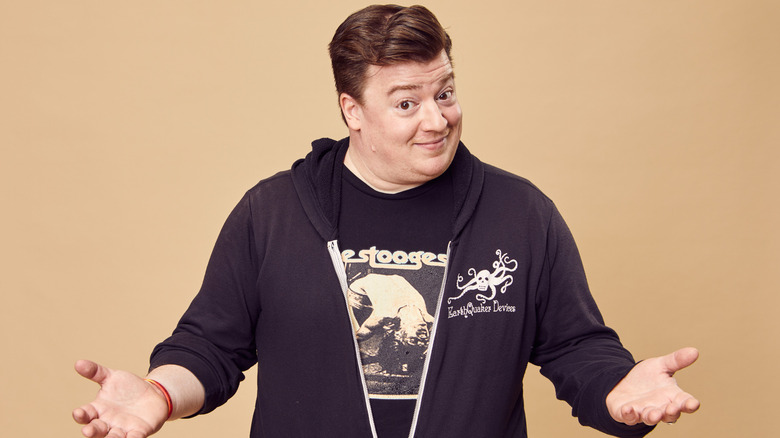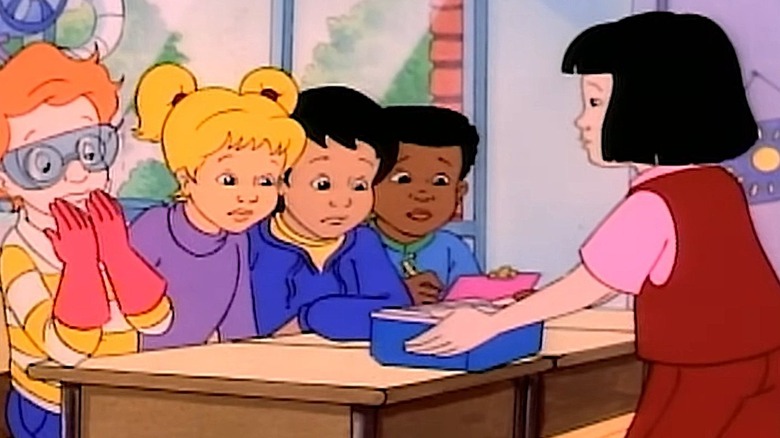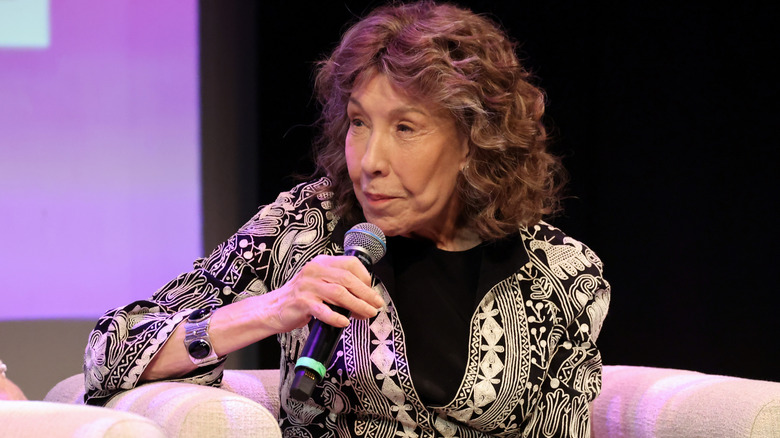The Untold Truth Of The Magic School Bus
If you happened to be of school age in the '90s, you probably have fond memories of the PBS animated series "The Magic School Bus," which ran for four seasons from 1994 to 1997. And as you may remember, the series centered on the curiously small class of Ms. Frizzle, the endearing if slightly loopy teacher who, in every episode, endeavored to teach her kids a thing or two about science by way of appropriately themed field trips. Of course, these trips took place aboard the titular bus, which was sentient, could transform into pretty much anything, and was used by Ms. Frizzle to get her class up close and personal with everything from the inner workings of the human body to the far reaches of outer space.
Crazily irresponsible though she might have been — as some adults may have noticed when watching "The Magic School Bus" — Ms. Frizzle was just as beloved by legions of '90s kids as she was by her own class: bookish, brainy Dorothy Ann, neurotic Arnold (who always knew he should have stayed home), cutup Carlos, born leader Wanda, future engineer Keesha, artistic and thoughtful Tim, everyone's best friend Phoebe, and always-enthusiastic Ralphie. It just may be because of the good teacher that some of those bits of science knowledge you have kicking around in your head have stayed there for all these years, but here are a few things about "The Magic School Bus" that perhaps you didn't know.
It was based on a popular book series
Perhaps you remember that, during those Scholastic book fairs at your elementary school, you could pick up "Magic School Bus" books, a few of which followed the plots of some episodes of the series. You might have assumed the books were based on the TV series, but it was actually the other way around. "The Magic School Bus" was created by children's author Joanna Cole; by the time the show debuted on PBS, the book series had already been running for nearly a decade, and volumes continued to be published during and after the show's run.
In an interview, Cole described how she based Ms. Frizzle loosely on one of her own science teachers, and envisioned her as someone who would be "very enthusiastic about science, and just plunge ahead, and the kids would be running to catch up to her." At first, Cole only made rough notes about the teacher's odd fashion sense — until illustrator Bruce Degen came aboard and relieved her of that duty. "Once [Degen] started illustrating it, I didn't have to write down what her clothes were like," she said, "because he had wonderful visual imagination."
Indeed, Degen's visual aesthetic was honored by the series' animators, and it's safe to say that "The Magic School Bus" was pretty much the coolest-looking kids' show of its time.
Some of the characters were based on the book illustrator's kids and their friends
In an interview, illustrator Bruce Degen described the road that brought him to "The Magic School Bus." An art school graduate with a Masters' degree, he spent about 10 seconds considering a career as a serious artist before remembering that, ever since he was a child, he had liked to draw for one primary purpose: to tell stories. When he was paired with Joanna Cole, he quickly found that he admired her ability to write in a way that was not just entertaining, but concise; she could, he said, put across complex scientific concepts in a way that kids could understand, all within the framework of a fun and fantastical story.
When it came to the creation of their characters, Degen described a method that was simplicity itself. "Joanna would make up a name, and I would make up a kid to go with it," he said. "And I would take my kids' school pictures from elementary school, and I would pick out kids, and what they were wearing ... and some of those kids are in [Ms. Frizzle's] class, and they don't know it. Although, one of my son's best friends is Arnold, he was the model for Arnold, and I didn't tell him until he was 16 years old."
The series broke new ground for PBS
For decades, PBS has been finding ways to make learning fun and accessible on the public airwaves for kids of all ages, from toddlers to tweens. Many of its shows are funded by the National Science Foundation, and Sandy Welch, who was the network's director of education in 1994 and later went to work for the NSF, described on the foundation's website the criteria that must be met for a television project to receive funding, and they are rigorous: The project must have been developed in accordance with the most current understanding of how children interact with educational media, it must have clear educational goals, and it must undergo evaluation to ensure those goals are being met.
Some of PBS' earliest beneficiaries of NSF funding included classic educational series such as "3-2-1 Contact," "Bill Nye, the Science Guy," "Zoom," "Reading Rainbow," and, of course, "The Magic School Bus." One of those things, though — in the parlance of "Sesame Street" — is not like the other. "We were excited [about "The Magic School Bus"] because it was the first fully animated science show," Welch explained. "I was excited to see a teacher featured, and not just any teacher — [Ms. Frizzle] was a delight."
A legendary animation studio helped with production
Bruce Degen's artwork might have been the "North Star" for the look of "The Magic School Bus" book series, but its animation style might have had a few familiar elements for kids who had watched, well, pretty much any other animated series during the decade before it debuted. Among the animation houses that contributed to the series was South Korean studio Hanho, which had a hand in an absolute ton of iconic animated series during the '80s and '90s.
The studio was founded in 1984, and it hit the ground running — within its first couple of years, it had contributed animation to shows such as "Thundercats," "Dragon's Lair," and "MASK." Later in the '80s and early '90s, Hanho's animators worked on the likes of "Teenage Mutant Ninja Turtles," "Care Bears," "Chip 'N Dale Rescue Rangers," "The Real Ghostbusters," and "Darkwing Duck." The studio worked on all four seasons of "The Magic School Bus," and it continues to go strong today; by its count, its animators have lent their skills to over 1,400 episodes of television and feature films.
The theme song was performed by a rock legend
A big part of the charm of "The Magic School Bus" lay in its intro, a breezy trip through a sampling of the weird types of situations we could expect to see Ms. Frizzle and her young charges get into, soundtracked by a rollicking, soulful, piano-driven theme song. That song, "Ride on the Magic School Bus," was penned by Peter Lurye — a veteran of kids' television who has served as a composer, arranger, or musical director on such classic series as "Bear in the Big Blue House," "My Life as a Teenage Robot," and "Dora the Explorer." Lurye's tune is an excellent one, to be sure, but it was lent a little extra spice by its performer — the legendary pianist, vocalist, and Rock and Roll Hall of Famer, Little Richard.
Once you know who sings the tune, it's impossible to mistake that voice for anyone else's — but, as it turns out, there were apparently a goodly number of fans of "The Magic School Bus" who had no idea who the theme song was sung by: a man who literally helped to lay the foundation upon which modern rock and roll was built. Upon his death in 2020, one thread on X spiraled out of control when a poster pointed out that he had sung the tune. One user summed up the general sentiment nicely: "I had no idea," they wrote, "but re-listening, how did I not figure that out?"
A comedy icon was the star of the show
Speaking of absolute legends whose voice you heard on every single episode of "The Magic School Bus," consider the voice of Ms. Frizzle herself. The teacher was voiced by none other than Lily Tomlin (pictured above), a comedy giant whose 50-plus year stage, screen, and television career has seen her score six classic comedy specials and a successful one-woman show. She has shared the silver screen with everyone from Steve Martin to Mark Wahlberg, and taken home two Tony awards, one Grammy, and no fewer than eight Emmys — one of which she won for her work on "The Magic School Bus."
In a 2022 sit-down with Vanity Fair, Tomlin reminisced about some of her most iconic roles. After some hesitation, she agreed to send the producers a tape, though, and when they gave her performance their stamp of approval, Tomlin took the gig. "That was fun, and I was very happy I did it," she said. "Because it was just wonderful to do a woman science teacher, and to do science in general."
The producer also had a familiar voice
One of the most fun parts of "The Magic School Bus" was a brief segment, after the main story and before the closing credits, featuring "the Producer." A nameless, endlessly patient sort, the Producer would field phone calls from skeptical viewers of the show, pointing out ways in which it had taken liberties with whatever science-y theme it had been exploring that week. The producer (usually accompanied by Liz, Ms. Frizzle's freakishly smart pet lizard) would usually explain that, due to the time constraints of a half-hour show, certain concepts necessarily had to be condensed or simplified. He would usually be in the middle of some science-y stuff himself, and since he was also endlessly polite, he would always thank the caller for their input.
The Producer's voice was also likely to be super-familiar to anybody who watched TV in the '80s: he was voiced by Malcolm Jamal-Warner, who had portrayed eldest son Theo Huxtable on the hit sitcom "The Cosby Show." Warner appeared in person to host "Behind the Wheel of the Magic School Bus," which accompanied the broadcast of the series' holiday special in 1996; it featured conversations with the entire cast, as well as some of the animators and even guest stars.
Some massive stars made guest appearances
When watching the show, you may not have realized that "The Magic School Bus" received assists in the vocal booth from a veritable who's-who of some of the biggest names in show business. Many of these were distinguished character actors: the likes of Ed Begley Jr., Rosalind Chao, Paul Winfield, Swoosie Kurtz, and Elliott Gould all appeared, some in multiple episodes. Yet others were Hollywood icons, such as Carol Channing, Tony Randall, Dom Deluise, Jessica Walter, Rita Moreno, Ed Asner, Alex Trebek, and Eartha Kitt.
Then, there were those guest stars who were absolute legends, three of whom were particularly notable. In the episode "The Family Holiday Special," none other than Dolly Parton (who was, incidentally, Lily Tomlin's co-star in the hit 1980 comedy "9 to 5") guested as Katrina Eloise "Murph" Murphy, the cousin of Ms. Frizzle and the operator of a recycling plant through which the class is given a tour.
In the series' final episode, "The Magic School Bus Gets Programmed," Malcolm McDowell appeared as Mr. McClean, the school's janitor. And, in the Season 4 episode "The Magic School Bus Goes Cellular," Tom Cruise appeared as himself (yes, that was really him).
The Netflix revival series was in the works for years
Perhaps the only surprising thing about a reboot of "The Magic School Bus" is that it took so long to happen. In 2014, it was announced that Netflix (which had been the streaming home of the original series for years) was bringing the show back with an updated spin for the internet era. At the time of the announcement, the show was tentatively titled "The Magic School Bus 360" — but it would be three years before the show would finally make its debut, with a different title.
In September 2017, Netflix debuted the first season of "The Magic School Bus Rides Again," with 26 episodes that explored such topics as quantum physics, space travel, robotics, alternative energy sources, and ocean exploration. The updated series featured a new Ms. Frizzle — Fiona, the younger sister of the original — and a new classmate, Jyoti, in place of Phoebe (who returned to her old school, briefly seen in the first series). The series did an admirable job of keeping up the inquisitive, unpredictable feel of the original, and fielded a second season in 2018.
The revival was met with some controversy
When "The Magic Bus" was relaunched in 2017, it employed an updated art style that was not exactly reminiscent of the original. The new series was all smooth lines and clean, curved edges; in particular, the character design was much more stylized, as opposed to the somewhat rougher but more realistic design of the original characters. The problems that some fans of the original had with the update weren't merely aesthetic — many of those fans saw the changes as a big, fat swipe at diversity.
The character of Fiona, for example, was rendered as classically pretty, almost in the mold of a Disney princess (as was the design of the original Ms. Frizzle, who did pop up in the series). This was at odds with Ms. Frizzle's classic design, which — with her bumpy nose and curly, frizzy hair — looked a bit more, well, average.
Most pointedly, though, the series was accused of making changes to the design of its Black characters, like Tim and Keesha. Looking at the original and updated versions side by side, it's tough not to see: the updated characters' skin is several shades lighter, and their features are much more cutesy than the originals.
The reboot kept the original's legacy of iconic stars alive
"The Magic School Bus Rides Again" was overall a worthy successor to the original — and, like its predecessor, it was not afraid to call in some star power for its regular roles and guest spots. Fiona Frizzle was voiced by Kate McKinnon, the "Saturday Night Live" alum who recently starred in 2023's smash hit feature "Barbie," and Lily Tomlin reprised her role as now-Professor Frizzle, who popped in on occasion to see how little sis was handling herself.
And then, of course, there were the guest stars. Most notably, in the debut episode "Frizzle of the Future," Will Arnett appeared as Galapagos Gil, who had a thing or two to teach the kids about ecosystems. In a pair of Season 2 episodes, Catherine O'Hara guested as Teresina "Aunt" Tennelli, leader of a circus troupe made up of Ralphie's relatives — and appearing as Tony Tennelli in those same episodes was the great Martin Short. We'd also be remiss not to mention that every geek's favorite actor, the always-awesome Nathan Fillion, also appeared in one of those episodes as a character by the incredible name of Axle ValveStuck.
Joanna Cole passed away in 2020
Unfortunately, though the legacy of "The Magic School Bus" is still going strong, the creative mind behind it is no longer with us. In 2020, after a battle with pulmonary fibrosis, Joanna Cole passed away at the age of 75. Not only did she leave behind generations of science-minded adults who grew up on the television series she helped create, she also more than did her part to advance the cause of childhood literacy — that is to say, she sold a whopping 93 million books over the course of her decades-long career as an author. Cole was also lauded by the press for the significance of her work, even before "The Magic School Bus" made its way to the public airwaves.
Cole was the recipient of an absolute truckload (or school bus-load, if you will) of awards, including multiple citations from the Children's Book Council, the American Library Association, and the School Library Journal. She also may have inspired the creation of more actual scientists than any other children's author.
It inspired the next generation of scientists
Everyone loves school field trips. Whether it's to visit a planetarium or science expo, there's nothing quite like getting out of the school grounds for a brief period of time to explore the world outside. "The Magic School Bus" understands this concept but blends it with fantastical elements, bringing the kids even closer to science than expected, such as the time when it turned Ms. Frizzle's bus into the ultimate Beatles' tribute in the form of a yellow submarine.
While the animated series was entertaining, it spiked the curiosity levels of many children at the time, including Alex Peterson's. In an interview with the National Science Foundation, Peterson described how she lost herself in an episode of "The Magic School Bus" where Ms. Frizzle and the children get baked into a cake, then need to figure out a way out of their predicament. "I loved baking when I was a kid," Peterson said. "Watching those air bubbles form, it just clicked for me that chemistry is what makes cakes, and I realized that this is what I wanted to do."
As fate would have it, "The Magic School Bus" fan would go on to do her doctorate in biochemistry at the University of Maryland. Peterson credited the show for piquing her interest in science — and this is exactly why the NSF funded "The Magic School Bus" in the first place. The NSF hoped to inspire the next generation of scientists through entertainment, and it did.
The Magic School Bus only won one Emmy despite several nominations
"The Magic School Bus" hit the tremendous trifecta of children's programming: it was educational, it was entertaining, and it was good — pretty good, in fact. Resultantly, it shouldn't be too surprising to find out that the animated series captured the attention of awards bodies that recognized its influence and overall value to '90s television, including the Daytime Emmy Awards.
It wasn't the first or last animated series to feature at the Emmys either — after all, "The Simpsons" has racked up over 100 nominations and dozens of Emmy wins. It's interesting to note, though, that "The Magic School Bus" only notched up one win after several nominations, which appears shocking when you consider how seminal the show was for its era.
The sole award went to Lily Tomlin for her role as Ms. Frizzle in the Outstanding Performer in an Animated Program category in 1995. Tomlin would be nominated in the same category for the next consecutive three years; however, she lost to Nathan Lane for his role as Timon in "Timon & Pumbaa" in 1996 and twice to Louie Anderson for his role as himself and Andy Anderson in "Life with Louie" in 1997 and 1998.
The Magic School Bus book series almost didn't happen
Every writer tells you that the most crucial and fundamental part of writing is actually sitting down and getting started by putting the words down on the page, regardless if they make sense or not at the time. (Others — and no, it wasn't Ernest Hemingway — say you should write drunk and edit sober.) For "The Magic School Bus" author Joanna Cole, she admitted that starting was the hardest part for her, because she doubted whether her book could work in the first place. So, she did what many writers do when in doubt: procrastinate.
"I wrote the first book, and I was very nervous about it, because I didn't know if I could do this — to combine all these things," Cole told Reading Rockets. "So, I cleaned out my closets, and I washed things. I mean, the kind of things I never do. And one day I said to myself, 'You have to write today. You have to sit down.' I sat down at the computer, and I wrote."
Cole explained how she didn't have every detail or aspect of "The Magic School Bus" mapped out, but she had the basic concept of a teacher taking her students out on field trips where they would learn about science, so she began with that. While the eccentric personality of Ms. Frizzle wasn't established yet, the character revealed herself more as Cole wrote down and expanded the story.
It tackled climate change
Climate change continues to be a heavily politicized topic, as there are still many who believe it doesn't exist — much like many others who think the Earth is flat and lizard people control all the financial institutions around the globe. "The Magic School Bus" didn't shy away from the topic, though, as "The Magic School Bus and the Climate Challenge" book was published in 2010 and tackled global warming, as well as some of the worst ways humans have impacted nature.
Author Joanna Cole knew that the topic of climate change would create waves, but she was adamant that the series stay committed to discussing important scientific issues, whether or not it ruffled a few feathers. In fact, as Cole told Coastal Review, she, illustrator Bruce Degen, and her publisher were all on the same page about making the book from the onset. "I said to my editor, 'Global warming is not really controversial and by the time this book comes out it won't be a controversy anymore.' Well I was wrong about that," Cole said.
The author stated that children need to be educated about these topics, since they are the ones who will be growing up in this world and have the ability to influence other people's perceptions. At the same time, the books provided practical methods for how they could make significant changes through methods like recycling and writing letters to congresspeople.
An original voice actor isn't a fan of the reboot
When news broke of the revival series, "The Magic School Bus Rides," fans wondered if any of the original voice actors who played the kids in "The Magic School Bus" would join the new show. After all, 20 years had passed since they had voiced their respective characters, so it's only natural that their voices may have evolved to the point that it would have been difficult for them to sound like kids anymore. Alternatively, they may have been out of the business altogether.
According to Daniel DeSanto, who voiced Carlos Roman in "The Magic School Bus" and has continued to act since then, he needed to audition for his previous role. "It's a little disappointing," DeSanto told the Daily Mail. "It became such an iconic show, and when the new one came out I still do voice work, and so does Stu [Stone, who voiced Ralphie Tennelli], and on 'Paw Patrol' I play a kid, so we can still sound young."
DeSanto didn't appreciate the fact that Netflix failed to reach out to the original cast about the roles on "The Magic School Bus Rides Again" in the first place. To make matters worse, he claimed that he hadn't heard back after his audition. Unsurprisingly, he wasn't too excited about the reboot.
Nasdaq celebrated The Magic School Bus' 25th anniversary
In 2011, "The Magic School Bus" franchise celebrated 25 years since the release of its first book, "The Magic School Bus at the Waterworks." While the publisher Scholastic hosted various activities, such as live shows and new product launches, and even tied the 25-year anniversary to the release of the Nintendo DS video game titled "The Magic School Bus: Oceans," there was one event that raised many eyebrows, because of how out of it came out of seemingly nowhere.
In October 2011, Nasdaq announced via a press release that Scholastic and an actor playing Ms. Frizzle would appear at the Nasdaq MarketSite in Times Square, New York, later that month. The representatives from the different organizations would then ring the Nasdaq Stock Market Closing Bell as a way to celebrate the 25-year anniversary of "The Magic School Bus." While it was a nice gesture to celebrate the franchise, it still seems like one of the most bizarre collaborations ever.
Fans wonder if The Magic School Bus and Captain Planet and the Planeteers share a universe
Society is living in the era of shared universes, especially when it comes to television shows and movies. It isn't outside the realm of possibility for new connections and partnerships to be formed between different franchises. Sometimes, though, fans come up with plausible theories about two properties that could be related.
In this case, it's "The Magic School Bus" and "Captain Planet and the Planeteers," which are both examples of edutainment. In terms of the former, it's all about science, but there is an aspect that addresses environmental friendliness, which is the core focus of the latter. Years ago, a popular meme did the rounds pointing out the similarity between the five Planeteers and five of the students from Walkerville Elementary — based on appearance alone, it looks like the Planeteers are grown-up versions of the kids.
In the Science Fiction & Fantasy community of Stack Exchange, fans debated any possible connection, but it was proven that the Planeteers didn't know each other before teaming up — unlike the kids from "The Magic School Bus," who attended school together. Also, "Captain Planet and the Planeteers" debuted in 1990 — four years before "The Magic School Bus" arrived on the scene. While there was a brief time in which both shows overlapped on air, it's highly unlikely that they take place in a shared universe, though it's a fun theory to ponder.
The cost of making the show wasn't cheap
As already established, there were a multitude of organizations behind and interested in "The Magic School Bus." Since it was edutainment, it was easier to get financial backing from both the private and public sectors. According to Current, between the network PBS and the Corporation for Public Broadcasting, they contributed $1.5 million to the production of "The Magic School Bus." The biggest investment came from tech giant Microsoft and the National Science Foundation, though it's unclear exactly how much each organization invested in the program.
According to Scholastic, the overall cost it took to make "The Magic School Bus" was in the region of $30 million — and this figure includes production costs, marketing, and other services. While this number looks like a drop in the ocean by modern standards, bear in mind that PBS was annually spending up to a maximum of $19 million for all its programming. That's new shows and renewals combined. Indisputably, "The Magic School Bus" was one of PBS' biggest series in the '90s.
The show cut down the number of students from the book
When it comes to any adaptation, compromises need to be made, because of the medium's limitations or conventions. It's only natural, because a television show, for example, has a limited amount of time to cover a story, while a book goes for as long as an author — or publisher — wants. "The Magic School Bus" wasn't immune to these alterations either, as it evolved from page to screen.
As covered by Twin Cities Geek, one of the biggest changes made to the series was the size of Ms. Frizzle's class in the animated series. While in the book she had 20 students under her tutelage, the show featured only eight. In turn, this shake-up aided the show in two major ways. One, it helped to cut down on animation time since there were fewer characters. And two, it allowed for the remaining characters to be better developed and receive their own traits and arcs rather than be just another student in the class.
Danny Tamberelli shared a similarity with his character Arnold
One of the most notable characters in "The Magic School Bus" was Arnold Perlstein. Unlike the rest of the students, the nerdy Arnold didn't enjoy the field trips or time outside of the classroom, always wondering what dangerous situations lay ahead for him and his classmates. The second actor to voice Arnold was Danny Tamberelli, whom many fans may know as Tommy Duncan from "The Mighty Ducks" and Little Pete Wrigley from "The Adventures of Pete & Pete."
As Tamberelli confirmed to the Daily Mail, he loved "The Magic School Bus" books before joining the show. In addition to this, he found a similarity between him and his character, as Tamberelli often didn't enjoy all the traveling he had to do to record his lines. "We shared similar characteristics because you may not enjoy the situation that you are in but you make do and something is going to happen and then you are going to come out and fix the problem," Tamberelli said.
After he finished up on "The Magic School Bus," Tamberelli continued to act, but he decided to quit the business to study music in 2000. He pursued a career as a musician, founded a sketch comedy group, and hosted his own podcast with his former "Adventures of Pete & Pete" co-star. In terms of ever returning to the role of Arnold, Tamberelli quipped that he would love to voice Arnold's father if the opportunity ever presented itself.
The child voice actors loved working together
For "The Magic School Bus" recordings, the child actors would record their lines in Toronto. As soon as they were together, they established friendships and a fun environment that wasn't all work and no play. Speaking to the Daily Mail, Erica Luttrell, who voiced Keesha Franklin on the show, explained how the cast members used to hang out with each other before going into the vocal booths and amuse themselves, but the shenanigans didn't stop when it was time to work. "Stuart [Stone] who played Ralphie was hilarious," Luttrell said. "He was always a jokester and fun to be around and added a really good vibe to the sessions as someone who was new to it."
Lisa Jai, who played Wanda Li in "The Magic School Bus," echoed what Luttrell said about the good-natured environment. Jai declared it was a hoot recording with her co-stars, but she singled out Stone and Daniel DeSanto for their mischievous antics that would crack everyone else up. "All of our mics were open so we had to be quiet but Daniel, Stu, and the first Arnold [voice actor, Amos Crawley] would make the girls laugh and we got in trouble," Jai said. "We would bite our fingers if someone was saying their lines and it was funny."
Lily Tomlin was reluctant to accept the part of Ms. Frizzle
It's impossible to hear anyone else's voice but Lily Tomlin's when you think of Ms. Valerie Frizzle. The seasoned actor and comedian had already left her mark on the entertainment industry before hopping onboard "The Magic School Bus," so the show securing her talents was truly the cherry on the cake for the production. Yet, Tomlin wasn't entirely sure if she wanted to play Ms. Frizzle in the first place.
"That was something where Scholastic came to me to do it, and at first I said, 'Oh, I'm not good at [voice acting],'" Tomlin told The A.V. Club. "But I said, 'If I do it, I want to make sure I do a good job, so let me just try and do a few things on tape and see how it feels or how it sounds.' And they still liked it, but I was very reluctant, because I don't ever think I do that kind of thing well."
Tomlin added that she thought her voice to be "real Detroit and real flat," but Scholastic liked her take as Ms. Frizzle and wanted her to voice the character. The actor also shared an anecdote of how she often gets introduced to children as Ms. Frizzle, but the kids never believe she's actually her.
In the mood to read more about series from the same decade as "The Magic School Bus"? Then, check out old '90s TV shows we still love and watch today.
